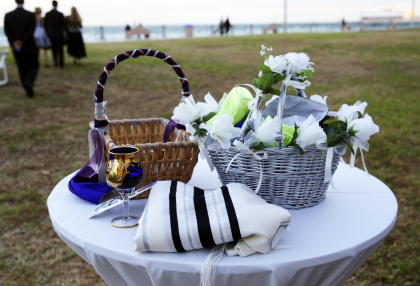How many of you have seen Fiddler on the Roof? If you have, scenes from the sacred-turns-riotous wedding are forever imprinted on your mind. The symbolism and simple beauty of the ceremony giving way to joyous celebration presented the very essence of the historic Jewish wedding. Now days, things may have changed, but Jewish weddings here and abroad often echo these same traditions, most strongly among the Orthodox Jews, but also somewhat with the Conservative or Reform congregants.
Traditionally, many Jewish matches were made when the children were quite young. There might have been a ceremonial betrothal meeting where the bride unveiled her face to the groom-to-be. Seven days before the actual marriage, the bridal dowry would have been displayed and a party given for the bride.
Currently, Western Jewish weddings take place at any time other than the Sabbath (Friday night/Saturday). Among the approximately 29% of Jews in  Israel and the 45% in the U.S. and Canada – with large pockets in New York and Los Angeles (Weddings: Dating & Love Customs of Cultures Worldwide – Mordecai) – the ceremony may be held at a temple, home or outdoors. The bride wears a white or cream veil, which the groom – clad in a yarmulke (skull cap) and tallith (prayer shawl) – lifts after he tastes the wine. She then sips from the same cup (the “loving cup”). The couple stands together under the chuppah (canopy) which represents the sweet unity of their future home. The bride’s ring is a simple gold band. At the end of the ceremony, a goblet wrapped in cloth may be placed on the floor and smashed by the groom, symbolizing the destruction of the Jewish temple. Shouts of “mazel tov” (“good luck”) echo from the guests.
Israel and the 45% in the U.S. and Canada – with large pockets in New York and Los Angeles (Weddings: Dating & Love Customs of Cultures Worldwide – Mordecai) – the ceremony may be held at a temple, home or outdoors. The bride wears a white or cream veil, which the groom – clad in a yarmulke (skull cap) and tallith (prayer shawl) – lifts after he tastes the wine. She then sips from the same cup (the “loving cup”). The couple stands together under the chuppah (canopy) which represents the sweet unity of their future home. The bride’s ring is a simple gold band. At the end of the ceremony, a goblet wrapped in cloth may be placed on the floor and smashed by the groom, symbolizing the destruction of the Jewish temple. Shouts of “mazel tov” (“good luck”) echo from the guests.
Orthodox Jewish couples are entertained at a reception, held at a hall or a home, by guests dancing in segregated circles to folk music. A line dance may also be performed during which the bridal pair are lifted into the air while seated on their chairs – as seen in Fiddler.
If you or your spouse-to-be claim Jewish ancestry, including some of these cultural touches can make your ceremony unique and memorable. We wish you “mazel tov!”

